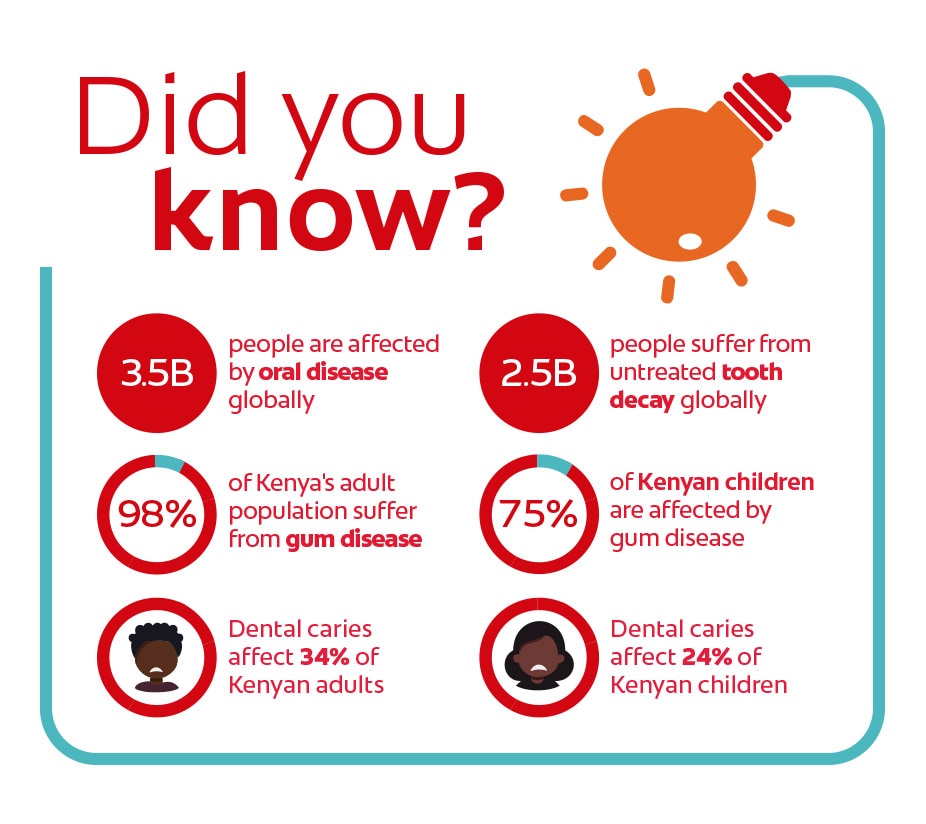
Keeping Smiles Healthy
Keeping Smiles Healthy
Colgate has been taking care of smiles for generations, by providing Oral Health Education and a range of various products that suit your every need to ensure that Everyone has a Future to Smile About.

-
Did you know that oral health is necessary for good general health and well being?
Oral health is linked to a variety of general health conditions. For example:
1. Severe gum disease (periodontitis) is linked to type 2 diabetes; good mouth health can improve the control of blood sugar levels
2. There is also evidence that severe gum disease is related to heart disease (cardiovascular disease), and to a lesser extent to cerebrovascular disease (affecting the brain) and lung disease (chronic obstructive pulmonary disease) . More research is being done to understand how they relate and cause these diseases.
It's not only important to brush twice a day but also have the correct brushing technique to ensure you keep your smile healthy :)
How to Brush:

-
Are you or your kids suffering from tooth cavities?
The term "cavities" is another word for tooth decay which can cause a hole in your tooth. Dental cavities form when the germs on the tooth surface turn free sugars in the diet (all sugars added to food by a manufacturer, cook or a person, plus sugars naturally present in honey, syrups and fruit juices) into acid which destroys the tooth surface over time. Habits such as what we eat and how well we take care of our teeth will have a direct effect on tooth decay.
Causes:

Plaque build up

Not brushing twice a day

Eating sugary foods and drinks
Symptoms:
 Toothaches
Toothaches Holes in tooth
Holes in tooth Dark stains on the tooth
Dark stains on the toothPrevention:
1. Brush twice a day with a fluoride toothpaste
- Brush in the correct way - cover all the tooth surfaces
- Brush for 2 minutes
- Floss daily
2. Limit sugary and starchy foods during the day - these feed the germs that cause cavities
3. Visit a dentist every six months for a regular check up
Try Maximum Cavity Protection toothpaste that contains fluoride and calcium to help fight cavities and strengthen your teeth.
-
Gum disease happens when there is a build up of germs (plaque) in the mouth. It can be seen as the swelling and the inflammation (redness) of your gums, which can be caused by a build up of plaque on your teeth.
Plaque is a sticky soft layer that forms around where the teeth meet the gums. It has germs and food debris. When plaque is not removed everyday with good brushing habits, it builds up and causes mild gum disease known as gingivitis. When the plaque is not removed it can harden and form tartar, both of these can cause gingivitis.
If gingivitis is left untreated it can progress to severe gum disease known as periodontitis. Periodontitis has many negative effects for the mouth and body and affect 19% of adults worldwide. According to WHO, 20% of Kenyans 15 years and above suffer from severe periodontal disease.
Periodontitis can cause teeth to become loose or fall out. Therefore it is very important to treat gingivitis as soon as you have symptoms.
Causes:
 Plaque build - up
Plaque build - up Tobacco use
Tobacco use Stress and poor diet
Stress and poor dietSymptoms:
 Swelling and red gums
Swelling and red gums Constant bad breath
Constant bad breath Bleeding gums when brushing
Bleeding gums when brushingPrevention:
1. Brush twice a day with a toothbrush in the correct way
2. Use floss daily
3. Consider using a mouthwash for extra protection
4. Consult your dentist
Try Colgate Herbal Toothpaste with a blend of natural oils that are proven to naturally give you strong teeth and healthy gums.
-
Tooth sensitivity or dentin hypersensitivity is a very common condition that affects a lot of people around the world. It is experienced as a sharp pain, and is triggered by eating hot or cold foods, drinking hot or cold beverages, breathing cold air, or eating sugary or acidic foods. This occurs when the enamel is worn down or if the gum line is recessed. In both cases the dentin (the layer below the enamel in the crown of the tooth) is exposed.
Causes:
 Receding gums
Receding gums Tooth Grinding
Tooth Grinding Brushing too hard
Brushing too hard Chipped or fractured tooth
Chipped or fractured toothSymptoms:
Experience sharp pain in teeth when:
 consuming hot or cold food & drinks
consuming hot or cold food & drinks breathing in cold air
breathing in cold air Eating sugary & acidic foods
Eating sugary & acidic foods
Try Colgate Sensitive Pro-Relief that acts as a protective barrier to help relieve and prevent sensitivity.
-
Did you know that left over food particles can cause bad breath?
Leftover food particles that are not removed by brushing can cause germ build up in your mouth and can result in bad breath.
But certain foods and drinks, gum or tooth disease and certain other conditions in our body can also cause bad breath.
Causes:
 Not brushing twice daily
Not brushing twice daily Gum and teeth problems
Gum and teeth problems Strong smelling food and drinks
Strong smelling food and drinksSymptoms:
 Sour or bitter taste in mouth
Sour or bitter taste in mouth White coating on tongue and throat
White coating on tongue and throat Dry mouth
Dry mouthPrevention:
1. Brush twice a day with a fluoride toothpaste
2. Brush your tongue
3. Consider using a mouthwash for added freshness
4. Consult your dentist
Use Colgate Maxfresh with cooling crystals for long lasting fresh breath.
-
Did you know your kids can start brushing their teeth with a fluoride toothpaste as early as when they get their first tooth?
It's important to start brushing your child's teeth as early as possible to ensure good oral health and cavity prevention. Parents are advised to supervise their kids when brushing until the age of 8 years old.
For children aged:

0 -6 Months:
Remove bacteria from your baby’s gums after every feeding by:
Using a cloth or gauze to gently rub baby's gums

6 months - 2 years:
Use soft-bristled, wide-handled toothbrushes with small heads
and mild fluoridated baby toothpaste
Only use a very small amount of toothpaste (equal to rice grain size)
Take care that your child doesn't swallow the paste.

3-6 Years:
Above 3 years use a pea-sized amount of a fluoride toothpaste.
- Take care that your child doesn't swallow the paste.
-
What is Fluoride?
Fluoride is a natural element released from rocks into the soil, water, and even the air. Fluoride can also be found in certain foods. It is a well known mineral that helps repair early signs of tooth decay and strengthen teeth.
Why do we need Fluoride in Toothpaste?
The outer layer of our teeth, known as enamel, is very hard because it consists of a lot of minerals, and fluoride is one of them. There are two ways that fluoride help to protect tooth enamel. Firstly, when your teeth first emerge fluoride helps strengthen the enamel so that it can be more resistant against acids. These acids are produced by germs in the mouth when we eat sugary foods and drinks. Secondly, fluoride also helps rebuild weakened enamel before it can be completely lost. Providing the teeth with regular fluoride through brushing helps the teeth stay strong on the outside and fight off cavities.
Since fluoride was added to toothpaste in the 1970’s, cavities have been reduced globally. The World Health organization recommends brushing twice a day with fluoride toothpaste to prevent cavities. Brushing your teeth frequently with a fluoride toothpaste from when they start to come out can ensure that your teeth get the protection it needs from an early age.
COLGATE® BRIGHT SMILES, BRIGHT FUTURES®
Bringing oral health education and smiles to children in need worldwide. Access educational materials to encourage children to learn healthy habits here.









